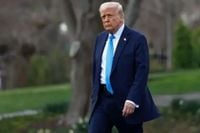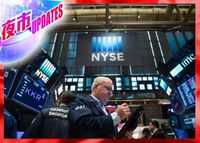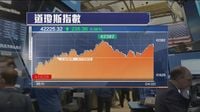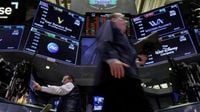The U.S. stock market experienced a rollercoaster ride on Wednesday, April 2, 2025, as investors braced for the announcement of new tariffs by President Trump. The Dow Jones Industrial Average rose by 235.36 points, or 0.56%, to close at 42,225.32 points, while the Nasdaq gained 151.16 points, or 0.87%, closing at 17,601.05 points. The S&P 500 also saw an uptick of 37.90 points, or 0.67%, ending the day at 5,670.97 points.
Initially, the market opened lower, with the Dow dropping as much as 360 points before reversing course about an hour into trading. This fluctuation was largely attributed to the anticipation surrounding Trump's announcement of "equal" tariffs on imports, which he declared would "immediately take effect" at a press event held in the White House Rose Garden.
According to reports, the tariffs include a hefty 34% on products imported from China, in addition to the 20% tariffs imposed earlier in February, bringing the total tariff rate on Chinese goods to a staggering 54%. Products from the European Union and Japan will face tariffs of 20% and 24%, respectively. Trump's administration confirmed that the 25% global tariff on passenger cars and light trucks would also commence on April 3, while tariffs on auto parts would take effect on May 3.
The announcement of the tariffs sent shockwaves through the market, with major tech stocks like Apple, Nvidia, and Tesla seeing declines of 7.7%, 4.8%, and 4%, respectively. However, Tesla's stock did manage to rebound slightly, rising 5.3% on reports that CEO Elon Musk may soon leave his advisory role in the government.
Former U.S. Treasury Secretary Lawrence Summers voiced his concerns over the tariffs, stating they could be the most costly and damaging in decades. He estimated that the tariffs could lead to economic losses of up to $300 billion, with each family of four potentially losing nearly $300,000 as a result. "These tariffs will push up U.S. inflationary pressures," Summers warned, adding that they could cause a recession.
As the market continued to digest the implications of these tariffs, analysts expressed mixed views. Some, like Chris Scicluna from Daiwa Capital, remained skeptical about the long-term impact, suggesting that negotiations would continue and that the final framework of the tariffs was still uncertain. The volatility in the market over the past several weeks has led many investors to believe that the recent sell-off may have been overdone.
Moody's chief economist Mark Zandi indicated that the probability of the U.S. economy slipping into recession has risen to 40%, a significant increase from 15% just a few months prior. He attributed this shift to the tariffs and cuts in government employment, warning that the ongoing trade war could have dire consequences for economic growth.
Despite the uncertainty surrounding tariffs, the latest employment data from ADP showed a positive trend, with private sector employment rising by 155,000 jobs in March, surpassing economists' expectations. This data provided some relief to investors, suggesting that the labor market remains resilient, even in the face of rising inflation and economic headwinds.
In other corporate news, Tesla reported first-quarter deliveries of 336,681 vehicles, marking a 13% decline from the previous year, although this was still above market expectations. The company's Model 3/Y deliveries also fell by 12.4% year-on-year, while sales in China dropped by 11.5% in March.
On the tech front, Netflix announced an upgrade to its TV-side language support, adding 12 interface languages and 8 subtitle languages, aiming to expand its reach in emerging markets. This move comes as the company targets 350 million subscribers by March 2025, particularly in regions like sub-Saharan Africa.
Meanwhile, Pfizer faced scrutiny from investors as the Institutional Shareholder Services (ISS) recommended voting against the company's executive compensation plan, citing a disconnect between CEO Albert Bourla's $33 million compensation and the company's stock performance, which has seen a decline of 28% year-on-year.
As the day progressed, the market's initial fears about the tariffs seemed to subside slightly, with investors hoping for clearer communication from the Trump administration regarding the specifics of the tariffs and potential negotiations with trading partners. The volatility in the stock market reflects the uncertainty surrounding the tariffs and their implications for the U.S. economy as a whole.
With the upcoming non-farm payroll data set to be released on Friday, April 4, all eyes will be on the labor market for further indications of economic health. Analysts suggest that if job growth falls below 100,000, it could raise concerns, while numbers above 200,000 might help ease anxiety among investors.
The unfolding situation regarding tariffs, alongside the mixed signals from the economy, continues to keep investors on edge, highlighting the complex interplay between trade policy and market performance.









